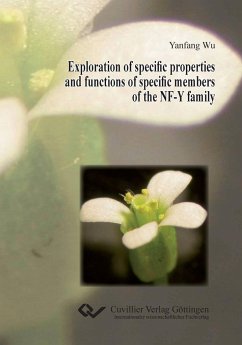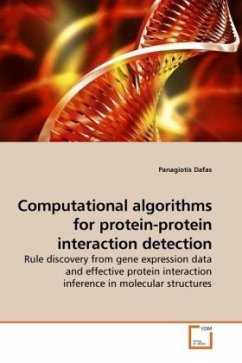
A NEW JOURNEY OF HU PROTEIN FAMILY
HU PROTEINS AS A NOVEL FAMILY OF NEURON- SPECIFIC REGULATORS FOR POST- TRANSCRIPTIONAL RNA PROCESSING
Versandkostenfrei!
Versandfertig in 6-10 Tagen
45,99 €
inkl. MwSt.

PAYBACK Punkte
23 °P sammeln!
Alternative splicing is a general mechanism in higher eukaryotic organisms to increase theirdiversity. In contrast to its importance, themechanism of alternative splicing regulation ispoorly understood, especially in the nervous system,where extensive alternative splicing occurs. Duringmy Ph.D. study, I identified a family of novelneuron-specific splicing regulators, Hu proteins. Mystudies provided solid evidence that support thesplicing regulatory function of Hu proteins. Twogenes that undergo neuron-specific splicing were usedas model in my research: calcitonin/CGRP and NF1. Incalcitonin/CGR...
Alternative splicing is a general mechanism in
higher eukaryotic organisms to increase their
diversity. In contrast to its importance, the
mechanism of alternative splicing regulation is
poorly understood, especially in the nervous system,
where extensive alternative splicing occurs. During
my Ph.D. study, I identified a family of novel
neuron-specific splicing regulators, Hu proteins. My
studies provided solid evidence that support the
splicing regulatory function of Hu proteins. Two
genes that undergo neuron-specific splicing were used
as model in my research: calcitonin/CGRP and NF1. In
calcitonin/CGRP gene model, Hu proteins inhibit the
recognition of the non-neuronal exon by two
mechanisms: blocking the positive splicing factors
TIA-1/R and suppressing polyadenylation. NF1 is a
well-studied tumor suppressor, and the
neuron-specific skipping of exon 23a has been
reported to change its activity. My research
demonstrated that Hu proteins strongly suppress
recognition of exon 23a by the splicing machinery in
neurons. In summary, my research has contributed
significantly to the understanding of the
splicing regulation in neurons.
higher eukaryotic organisms to increase their
diversity. In contrast to its importance, the
mechanism of alternative splicing regulation is
poorly understood, especially in the nervous system,
where extensive alternative splicing occurs. During
my Ph.D. study, I identified a family of novel
neuron-specific splicing regulators, Hu proteins. My
studies provided solid evidence that support the
splicing regulatory function of Hu proteins. Two
genes that undergo neuron-specific splicing were used
as model in my research: calcitonin/CGRP and NF1. In
calcitonin/CGRP gene model, Hu proteins inhibit the
recognition of the non-neuronal exon by two
mechanisms: blocking the positive splicing factors
TIA-1/R and suppressing polyadenylation. NF1 is a
well-studied tumor suppressor, and the
neuron-specific skipping of exon 23a has been
reported to change its activity. My research
demonstrated that Hu proteins strongly suppress
recognition of exon 23a by the splicing machinery in
neurons. In summary, my research has contributed
significantly to the understanding of the
splicing regulation in neurons.












